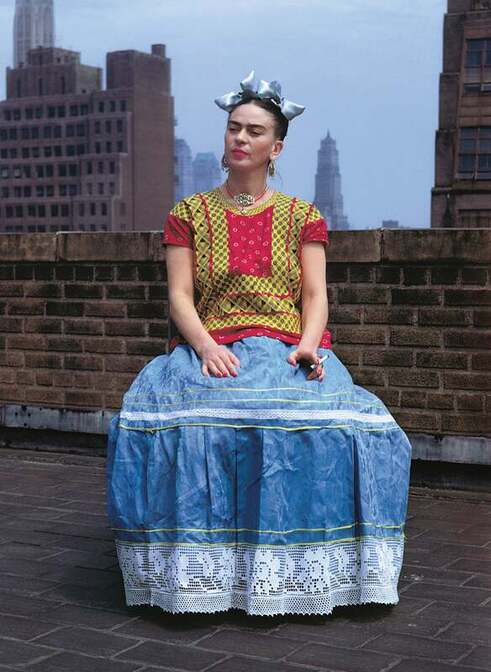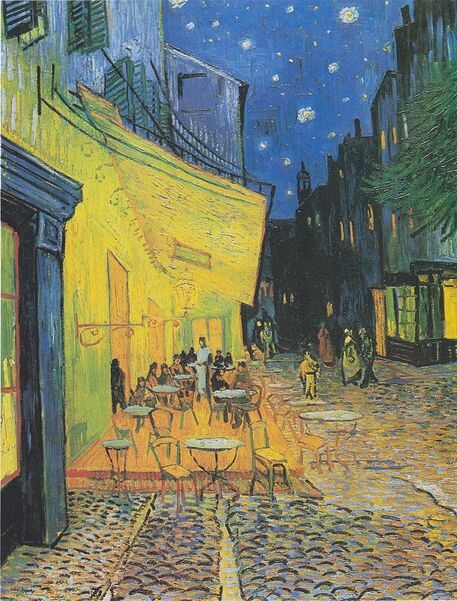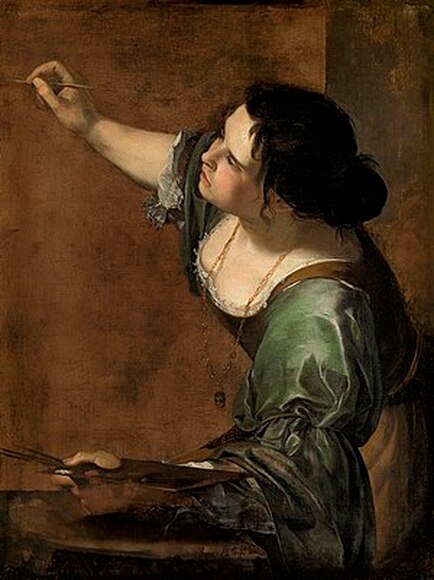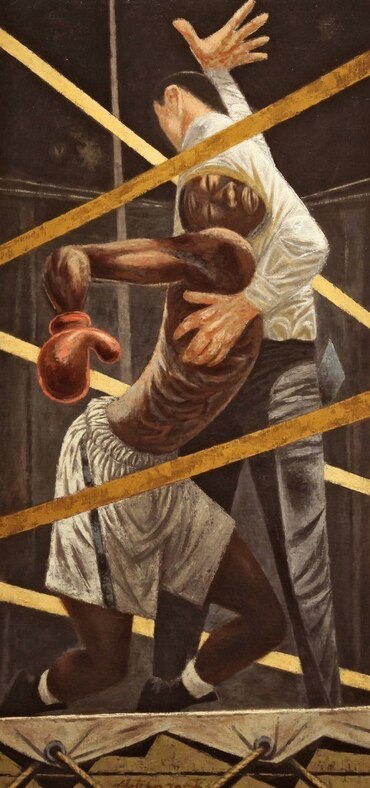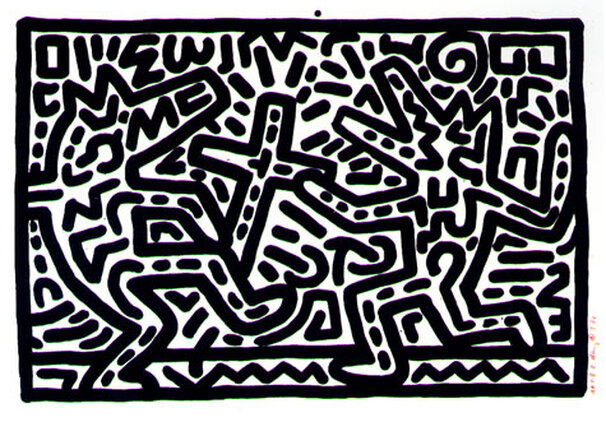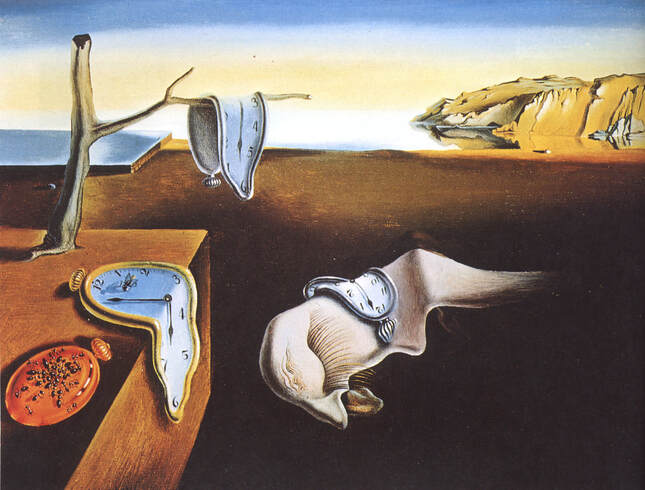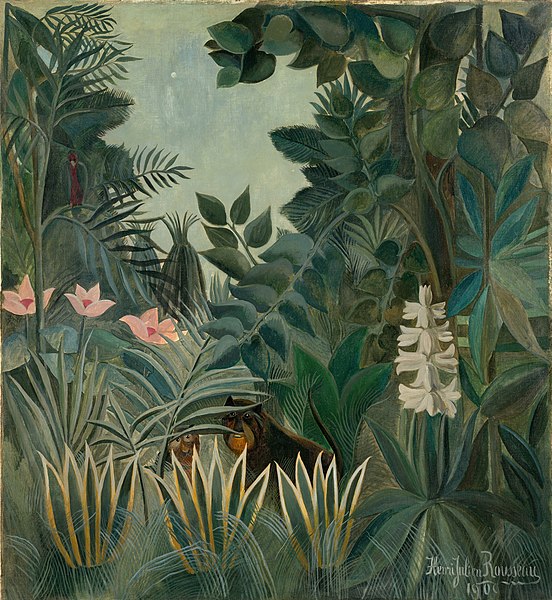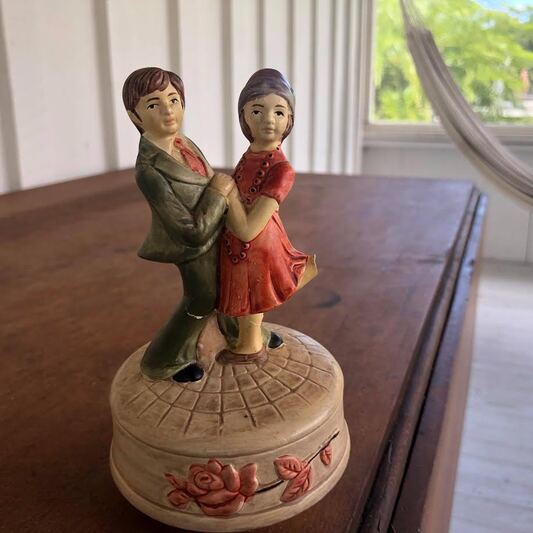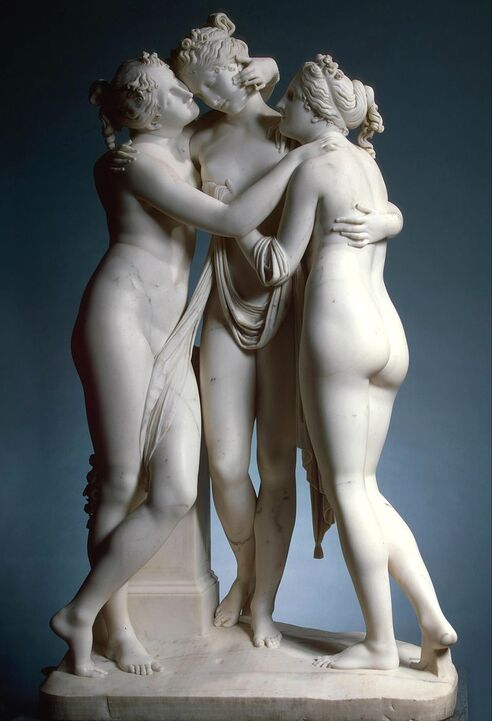|
On Frida in New York, Photograph by Nickolas Muray You, sitting in a chair on a rooftop at Nick’s flat. New York behind you. Brown brick to your back & periwinkle sky that on a clear day… Simple brown building with dark windows left shoulder. To your right: more sky, spire, then brown building out of frame. You, pensive, head tilted left, wearing a bow in your hair same colour as sky, a bow like four pocket squares. Lipstick, earrings with weight. Your neck in a necklace. Silver flower? Shoulders beat the ledge, a blouse that requires two stanzas: red & gold pattern in emerging U w/ horizontal black triangles down the left, across the midriff, up the right, then red interior with white amoeba-like circles. You, in a patterned light blue skirt fanning out ending white lace on the roof. Arms in your lap, nails red, cigarette left hand. No shaking, perfectly at home with your art, here, in Mexico, anyplace. To you the city adapts. Tremors are thorns in self-portrait. Your pulse at rest ticks louder than traffic. Eric Steineger Eric Steineger is the Managing Editor and Senior Poetry Editor of The Citron Review. His work has been featured in Waxwing, Rattle: The Poets Respond, Tinderbox, The Los Angeles Review, and other places. His chapbook, From a Lisbon Rooftop, is based on Portuguese poet Fernando Pessoa's The Book of Disquiet and is available at Plan B Press. Occasionally, he curates poetry events at Black Mountain College Museum + Arts Center. He lives in Asheville with his wife and daughter.
0 Comments
Van Gogh’s Café Terrace at Night March 2020, the newborn, COVID-19, kicks and screams, Look at me! Look at me! My husband and I stay home, work from home, eat at home. Restaurants no longer open for casting off the day’s stress with margaritas and enchiladas. Our trip to France cancelled, no dancing across the cobblestone, in Arles. We won’t slide into orange chairs pulled out from a white table, or beckon friends to eat, drink, tell bad jokes. We sit on the couch, catch daily statistics, how many new cases, how many deaths. Who are heroes and who are hideous. New normal: balcony empty, shutters closed. Light glows in the windows of tall buildings, spotted sky embraces. Limbs of a tree border a building, want to touch it while they still can. Robin Wright Robin Wright lives in Southern Indiana. Her work has appeared in Re-side, Black Bough Poetry, Spank the Carp, Ariel Chart, Young Ravens Literary Review, Muddy River Poetry Review, and others. Her work was nominated for a Pushcart Prize by Panoply, and her first chapbook, Ready or Not, is forthcoming from Finishing Line Press. Pray For The Paintress To feel the strength of his belief, my head against his heart, the dark walls of night opening to a last intimacy was to feel how the universe was altered by a storm surge, time an unlimited translation of what he had been to me -- flesh and flash -- the lightning bolting what had ever been an anonymous doorway, lock and key and words, roses I'd plucked from the garden to go with the bread, and the wine called blood -- what he would shed when the heavens were ripped open in premonition -- the sky falling! paradise in storm and stigmata! how the earth is scarred and wounded by the nails and thorns; yet his heartbeat remains steady, and true, as the doorway frames the dinner, a lunette as I painted the table, how I was dear to him hidden in the background of his passion, my paint brush shaping the twelve -- John, Andrew, James, Phillip, Bartholomew, Matthew, Thomas, Simon; Judas who will betray love with a kiss; 2 named Judas, 2 Simon, and 2 James -- how church history confuses and explains why I must be hidden, ghostly as the spirit of the moon, mother, somehow, to 12 rising suns -- All for One! -- Pray for me! as I do not follow the Order of instruction -- Do Not Sit Near The Son of God! Do not imagine it is you who fills his heart on this last night in one world before we cross to another, O my love, before the paint dries. Laurie Newendorp Laurie Newendorp is unsure of many things. Sometimes visionary, she has tried to explain the inexplicable in her recent book, When Dreams Were Poems, but the essence of love and spirituality -- their certainty -- can only be described as those who are in her heart. Nelli's painting beautifully describes comfort, as do Stanley Plumly's words about his birth, and his grandmother, in “After Whistler,” a poem that ends "...holding me small in her small arms, hers, in the calendar dark, my head against her heart." ** Someday I Will Love John Milkereit
John, no need to worry. A piece of bread is only a piece of bread. John, keep it if you want or give one or two pieces to your guests or not. You do not have to count. No fair share since betrayal is eating supper. If you want to offer a gentle touch to Mary wrapped in her red and olive cloth. If you want to drink more wine, just ask for more, no need to keep glasses full. And no need to cut the roasted lamb in the turquoise bowl. You have never liked fava beans, so do not eat those. Or the lettuce heads. Be gentle on yourself looking holy with a halo. A moon sliver awaits your naked body behind these brown panels. John, it’s the last night to dance. So go, just laugh, and say “I will. Yes, I will.” John Milkereit John Milkereit is a mechanical engineer working in the oil & gas industry, who lives in Houston, Texas. His poems have appeared in various literary journals including The Ekphrastic Review, San Pedro River Review, and The Ocotillo Review. He completed a M.F.A. in Creative Writing at the Rainier Writing Workshop in Tacoma, WA in 2016. His most recent collection of poems, Drive the World in a Taxicab, was published by Lamar University Press. He is working on his next collection of poems. ** Dear Sister Plautilla Nelli from your conservator, Rossella Lari “It’s not unusual for conservators to spend more hours alone with a great work than the artist themselves.” The Last Painting of Sara de Vos, Dominic Smith “One will never get closer to an artist than in the restoration studio.” — Rossella Lari, conservator In the beginning, I stood in awe before neglect. Your painting once rolled like a canvas rag and stored in a drawer. A victim of floods, of Napoleon’s dislike of religious art. So much damage to your Jesus and his disciples. Could I resurrect the first Last Supper by a woman? As the years passed, I began to see you-- self-taught painter woman nun—more clearly, to learn how you worked, how you mentored sister apprentices in the power of strong brushstrokes and chiaroscuros. You knew what you wanted, as surely as any male master-artist of the 1600s. For four years I have stood before your art. The work has ended. For the painting-- a new beginning. I thank you for nourishing me as Jesus nourished his followers. I stand in awe of the veined hands, muscled arm, Jesus’s eyelashes. In awe of your courage, painting under the rule of Savonarola, hellfire preacher of the ferocious, burning eye, who approved of your tableaux, how they saved women from the deadly sin of sloth. Sandi Stromberg Sandi Stromberg is thriving on challenges from The Ekphrastic Review. What better company during lockdown than poetry and art! She has poems accepted for the 2021 Texas Poetry Calendar, Snapdragon: A Journal of Art and Healing, and loved contributing to formidable woman sanctuary’s Spring 2020 Renga issue, the editor’s aim to create “evolutionary-lit.” ** Float I rest my head in your hands, close my eyes and feel your shoulder beneath my ear. I remember the first time you held me this way. I remember their fight: something about a wandering eye, and the dinner table conflagrated before our eyes. The heat of our father’s breath, the shrill of our mother’s tone, the soft pace of your fingers across my back. You took me to the stars, let us watch the eruption of our home from the distance of a lightyear. Thank you for making me an astronaut, for showing me how to float, eyes closed, when forks and tablecloth felt heavier than Earth itself. Niko Malouf As a teenager living in Los Angeles, I enjoy writing about the things that surround me, stimulate me, the events of my adolescence as well as the happenings of the world. I hope to share my experiences and perspective with others and inspire them to do the same. ** 2008 C.E.: The Last Supper at George’s for George, Nick, Christiana and Shaohua 1. “How is the spaghetti? Is the beef missing something?” Surprisingly, this time, Christiana needed some reassurance. “We still should’ve made something special. But you, Big-Babies, were too impatient and needed something fast. So, Bon Appétit!” She lodges the case in her defence straight away, too. “Here, Malaka![1] A hint of some olive oil should make it edible. It’s straight from my Olive Gardens in Crete,” teasing her, George passes me the unbranded and unlabelled glass bottle. “And eat some Feta; it’s homemade feta—my grandma’s special recipe. It’s good for you!” George’s hospitality had always been second to none. 2. “So, shall we?” Nick sends a quick glance my way for an approval. “Sure, Dr. Karf! What better way to compliment ‘The Last Supper’ than a fine tobacco, Stella and chess,” I reaffirmed. 3. The Next Morning In the bus, en route to the Heathrow Airport to fly out of the UK for the last time, I couldn’t stop reminiscing and smiling: we treated ourselves—and deservingly so, too—by paying a visit—a homage, more like—to the grave of Karl Marx in London before saying the last goodbyes. And back in 2004 C.E., it was merely a romantic idea to return to Leicester to further our personal and academic causes by continuing onto the PhD programme. … Shaohua will be fine; she will be fine! Postscriptum Ever so often, I leave this song, Yaarian (Friendship), by Vital Signs[2] playing in the background: To those, who leave friends behind, Life must be awfully harsh.[3] Saad Ali [1] ‘Malaka’ implies a loser or an idiot. It’s a very common slang used by the Greeks, when having a casual conversation among friends. But outside of a casual friendly conversation(s), this slang can be very offensive, if said to a stranger. [2] Vital Signs are an iconic music band from Pakistan, who revolutionized the Pop Music Scene in the South Asia in the 1980s. [3] This is my literal translation of the lyrics by Vital Signs: “Yaaron ko, Jo bhe choar kay chalay jaatay hain, Unhain zindage rulati hogi.” Saad Ali (b. 1980 C.E. in Okara, Pakistan) has been brought up in the UK and Pakistan. He holds a BSc and an MSc in Management from the University of Leicester, UK. He is an existential philosopher-poet. Ali has authored four books of poetry i.e. Ephemeral Echoes (AuthorHouse, 2018), Metamorphoses: Poetic Discourses (AuthorHouse, 2019), Ekphrases: Book One (AuthorHouse, 2020), and Prose Poems Βιβλίο Άλφα (AuthorHouse, 2020). By profession, he is a Lecturer, Consultant and Trainer/Mentor. Some of his influences include: Vyasa, Homer, Ovid, Attar, Rumi, Nietzsche, and Tagore. He is fond of the Persian, Chinese and Greek cuisines. He likes learning different languages, travelling by train and exploring cities on foot. To learn more about his work, please visit www.saadalipoetry.com. ** The Last Supper by Sister Plautilla Nelli, OP 1524-1588 to the cloistered dominican sisters in lufkin, texas as a child perhaps she was left at the convent-- a family commodity like so many others but then as now life was full of surprises and she was certainly one . . . donning her black and white lifestyle whose cloistered walls sheltered sacred spaces she canvased into color her self-taught learning then she taught women like herself who would gift this holy supper to grace the nuns own meals in the dining room of their own hidden lives Sister Lou Ella Hickman Sister Lou Ella Hickman’s poems and articles have appeared in numerous magazines and journals as well as four anthologies. She was nominated for the Pushcart Prize in 2017. Her first book of poetry entitled she: robed and wordless was published in 2015. (Press 53) ** Praying Because of the Paintress ‘Nelli signed her paintings as "Pray for the Paintress" after her name, confirming her role in spite of her gender’ - Wikipedia the haloed saints turn to You like sunflowers soaking in soft sun rays, genome of devotion visible along sinewy palms, their mien ruffled like flower petals caught in a storm You coast through the Last Supper, reveal the calculus of betrayal and break bread with the traitor snow shower of crumbs meld into the crisp white table-cloth, the scene safe and secure, ferried along the route of proper channel, from master to disciple until it reaches the paintress who leads me to the threshold of history so close, I can hear nirvana breathe through pores of the lit painting wings of a silent prayer flutter on my lips before take off Preeth Ganapathy Preeth Ganapathy is a software engineer turned civil servant. She is an officer of Indian Revenue Service who hails from Coorg and currently resides in Bangalore, India. Writing has been her passion since childhood. Her works have been published or are upcoming in Nymphs, The Short Humour Site, Red Wolf Journal and Spark (India) among other online magazines. ** The Rectangular Table Thoughts become things, solid and immovable, packed with the emotional weight of betrayal-- constructed carefully to contain the faithful, to defend against heresy, to prevent escape. Who will name the mothers, the daughters, the spirits of the holy, the sacred, earth? What is outside this room remains unheard, unseen, meaningless--limited to the symbolic artifice of a vessel that contains only the blood of fathers and sons, filled to the brim with the reigns of kings and princes who deny the dances, the wisdom, of women, the circles that follow the moon, the earth, the seasons without end Kerfe Roig Kerfe Roig is sheltering, writing, and making art in New York City. You can see more of her work on her blog https://kblog.blog/ ** Untitled it’s the fold of the tablecloth he notices, resting his blurry head against jesus’ shoulder, warm on wine, warm by the hand cupping his cheek like a mother’s would, like his mother’s did. the tablecloth is so even, and he can feel the lip of one of the folds brushing against his knee, and he takes one of his hands, probably the left, and pinches the cloth between his forefinger and thumb and trails along the rough hemmed edge, it is the nicest table cloth he has ever seen, it is the nicest fabric he has ever touched, and jesus’ head droops to rest on his, like a brother would, like a tired friend would. but jesus is not the tired one, and the steady wash of his words, muffled and darkened by wine, like when he would drowsily nod off as a child listening to his grandmother and grandfather talk the only room over, candlelight whispering yellow and blanket scratchy under his chin, just like the itch of jesus’ beard, but that is grazing his forehead, not his chin, like his lord would- kindly, reassuringly, pulling him to a more comfortable position that he didn’t even know he wanted but his lord did, and he closes his eyes as one of the other men speak up. and the night softens to his blood in his heart and the tablecloth’s rough seam against his fingertips and jesus’ words spilling spilling spilling. jesus leaves him there when he must depart, unwoken, and so does everyone else, just like when he was a child and his older brothers would leave him behind when they didn’t want to play with him, and he blinks bleary buoyant a little still, and he sits up and the tablecloth is uneven now, the squares not as uniform, wrinkled and twisted, and jesus’ shawl is draped over him, smelling like him, like his mother’s scarf did whenever she gave it to him when he was cold. and that was the last time he saw jesus. he didn’t realize it, though, because he was pulling the shawl more tightly over him and dropping his head back down onto the bench and staring at the closely blurred lips of the twisted folds of the tablecloth he remembers admiring through the fog the night before. Madeline McConnell Madeline McConnell: "There is nothing you need to know about me." ** To Sister Nelli Regarding The Last Supper How fitting work they resurrect you so uniquely would perfect as Passion that you dared embrace as if the meal so commonplace to holy women given art to shield from sloth devoted heart yet left to learn, each on her own, by wit and grit the skill self-grown to craft this moment much like those depicted who from lives arose as ordinary souls to be the face of faith and destiny by journey each would tread alone together by example shown. Portly Bard Portly Bard: Old man. Ekphrastic fan. Prefers to craft with sole intent of verse becoming complement... ...and by such homage being lent... ideally also compliment. Choosing a Self-Portrait I have so often thought I’d like to be as elegant, irresistible as Ingrid Bergman or Audrey Hepburn, as self-possessed as Katharine, but I’ve never wondered which fine art beauty I would like to be. Today with so much leisure . . . Of course the puzzling Mona Lisa with her subtle smile I could find an easy choice, though once when in her court, a bald Swiss asked if I might make myself available each time he came to call in Paris, on business, so maybe I should consider brave Judith in Caravaggio’s hands who seems as young as I was then, with such distaste, confusion, empathy in her youthful eyes while slicing off Holofernes’ head, but now years later, I might prefer to bask in Vermeer’s clear light as a milkmaid intent on her daily tasks, full of purpose, knowing and giving simple pleasures, or to be caressed in Rembrandt’s chiaroscuro, making my spirit glow, his warm gold acting as a perfecter like love in every portrait of Saskia, for the gentle shadows could soften all my faults, which seem so unyielding to a woman of a certain age in daily need of concealer to blur what ifs and regret. As I’ve always envied those who move unconcerned how much bikini-clad flesh wiggles, should I seize self-confidence, be naked at a picnic lunch in the park or at a brothel in Avignon, a diamond of a woman at once masked and unmasked, gazing straight at you? That might do for me what years of therapy have not: I could stride forward in victory like Samothrace in marble as supple as gauze, grieve as ageless as Mary in St. Peter’s cradling Christ in death as she had in birth, or worship Him in ecstasy as St. Theresa of Avila, my stone cheeks as luminous as skin, but then I picture Caravaggio again offering his scandalous view peering up the nostrils of a dead Virgin. Another possibility to explore… yes, I might prefer it to the others, as it seems more like the me I know: White Light by Jackson Pollock, a melding mosaic with an order of its own emerges from paint thrown on the canvas like indistinct experiences building up inside our frame. Perhaps after looking back, I’d better settle on an allegory of life as a self-portrait by Gentileschi, whose brow shines with effort and tresses tumble loose, and join her in preparing to paint today on an empty background of earth. Elaine Wilburt Author's note: "As lockdown continues worldwide, some art lovers are creating parodies of famous works. They are entertaining themselves as well as sometimes their children and countless others by sharing their photos. After reading the article, I began to wonder which portrait I would like to be, and I wrote a poem instead." Elaine Wilburt’s fiction and poems have appeared in The Cresset, Little Patuxent Review, Route 7 Review, Heart of Flesh and Thimble Literary Magazine, among others. She volunteers as a copy editor for Better Than Starbucks. A graduate of Middlebury College, she received a 2019 Creatrix Haiku Award and lives in Maryland with her husband and five children. The Undefeated: Homage to Jersey Joe Walcott I In the painting The Undefeated by Fletcher Martin (1948) the all but unconscious Jersey Joe Walcott —born, Arnold Raymond Cream—flows down the chest of the white referee like a waterfall of black water. With his right hand raised the ref signals he’s called the fight. With the left arm around the boxer’s waist he attempts to hold back the flow of water —Joe Louis, the victor “unusually”, as the notation at the side of the painting mentions, is not depicted. Walcott, continues boxing, nevertheless, defeating Ezzard Charles to become the oldest heavyweight champion up till then. It is his second attempt. He is thirty-seven. It is 1951. In the earliest fight I can remember, I am a child sitting at the side of my father. I am in pajamas; my father’s in boxer shorts and t-shirt (he is a shoemaker). It is 1952. Rocky Marciano has just won the heavyweight championship of the world, defeating Jersey Joe Walcott. I have little memory of the bout: the fanfare, the expectation as the ringside announcer introduces the boxers, has them shake hands, turn to their corners as they wait for the bell… even of Marciano—a persistent though clumsy boxer… a slugger…but Jersey Joe Walcott, remains with me: the great mass of the man crumbled on the canvas, the accumulation of years of boxing weighing him down as the force of gravity sucks him toward its infinite center. I remember the flash of the right cross to the chin. Boxing experts calculate it was one of the hardest punches ever thrown. II The rage of Florida’s summer sun at midday fills the halls of the museum with refugees. I stand facing the Fletcher Martin. I arrive from a connecting room where Shiva dances the world into destruction. He holds one arm upward, palm turned to us—a gesture of peace: “Do not fear” Parvati will simultaneously make new what her consort has destroyed: out of one is born the other: Where does one divinity end and the other begin? Buddha—a new acquisition from the nearly destroyed Cambodia—sits lotus fashion, palm turned toward us. I seem to remember an illustration from my childhood catechism book: Christ is walking with children. The colors are bright, children’s colours. It is a Christ depicted for children. He holds a palm up extended toward the child reader. A young mother whisks her two children from the Eastern Divinity hall into this one in which I am standing. I cannot hear what she tells them, but the children seem to listen …for the moment. They pass from painting to painting Two young women, maybe on a high school assignment, sit before an abstract…the artist, a contemporary of Martin’s. They take notes. One rests her head on the other’s shoulder. The rage of the Florida sun has brought us here. III Jersey Joe, you drop out of school at fifteen to take on the burden your father leaves at his passing: mother, siblings—eleven: Your father was born in St. Thomas; mother, from, Pennsauken, New Jersey, corruption of a Lenape word, reminder of history’s entwinement of souls. But where does it begin? How does it matter? Somewhere on both sides —mother’s, father’s—treads the Middle Passage, silent, perhaps, but there, a thread in the weave of the soul. Passage between all that will be—must be-- forgotten and all that must follow. Many survive. Many do not. The sea knows their numbers. No one else. Auction block, fields of cane, tobacco, scars the wads of cotton cut into the palm of the hand. Something must be born of it all, must weave itself into the soul’s—not the body’s—DNA: amorphous yet hard, almost diamond-like yet dark, a darkness that supersedes the darkness of a ships dank hull, confines it to shadows, transcends the odor of flesh rotting on the bone. Not of the body but of the soul, the pull and tug of life—wordless, passed on to the children of the children through the darkness that lights the eyes, a gesture of the hand. IV Arnold Raymond Cream, you take the name “Joe Walcott” to honour a former champion. To which you add “Jersey.” Is it only to distinguish yourself from an old idol and the name “Jersey” is handy…your home? Or is there more? Is it that even the Middle Passage must have end, a place you stake out as yours and it is much later that you become the land’s, not by enslaving the soil but through that feeling on a Sunday Morning, after the brawls and ravages of a Saturday Night? A lone tree survives at the end of a garbage strewn street. A blanket is laid on the grass of a minute park the chaos leaves untouched. And what survives in the soul (molecule or molecules added to the soul’s DNA) of those who have made the Middle Passage comes alive. Your eyes open to the things of this world as if—or through—a seedling of love, and what you love becomes a part of your name, and you a part of a place. Is there another way? In that bout, in that memory of you that never leaves me, as the memory of my father beside me never leaves me, Rocky Marciano may be waiting in a neutral corner for, after all, he was always a clean boxer. And yet I do not see him. The mass of yourself lies crumbled on the canvas. Will you ever get up? How can you not? Vincent Spina Vincent Spina is from Brooklyn, NY. He is a retired Associate Professor of Spanish Language and South American Literature. Spina has published three books of poetry: OUTER BOROUGH: Pecan Grove Press, 2008; DIALOGUE: The Poet’s Press, 2015; THE SUMPTUOUS HILLS OF GULFPORT: Lamar University Literary Press, 2017. Recent poems have appeared In VOX POPULI, an online journal, VEXT, also online and THE BRIDGE LITERARY ARTS JOURNAL. The Wolves and the Crucifix The wolves keep coming to my door, they keep coming. Today they hold a cross like a trophy. Ink drips from their paws onto the cross. I don’t know what went wrong, how it all happened. They asked for so little—for the drawn lines to merge over their heads, a sky to appear, some earth to support them. They ran around in circles, they bit each other’s tails. I gave them the sky and the earth. I let them grow bigger than what I could see in myself. Their black frames stumbled and fell on white ground. How could I have known that a day would come when they stretch their limbs and walk on two legs? How could I have known that the white space within them would grow large enough to resound? I only saw their open mouths. I only knew that they howled. Romana Iorga This poem was first published at The Gateway Review. Originally from Chisinau, Moldova, Romana Iorga lives in Switzerland. She is the author of two poetry collections in Romanian. Her work in English has appeared or is forthcoming in Bellingham Review, Lunch Ticket, American Literary Review, and others, as well as on her poetry blog at clayandbranches.com. Tick of the Clock The one thing I was always dying to know was the inner workings of the clock, thinking if I could learn it inside out, I might learn to pace myself and live smarter. Its speed freaked me out, really (much more than the breast-cancer episode, if you ask me). The thing is, I was sprinting right at the beginning of the race, and at some point had a feeling I’d run out of energy before the finish line, so I broke into a clockmaker’s store to get some answers but, to my sky-high disappointment, left empty-handed. Then, quite unexpectedly, I swallowed a clock and crossed “buy a new clock” off my to-do list. Setting its speed tuned out to be easier than I thought. I followed the instructions in the manual, looked for a small screw underneath and turned it counterclockwise. Each turn of the screw was supposed to slow the clock by two minutes per 24-hour period, which I thought fair enough. However, having realized I got the upper hand, I went on to make adjustments several times over the course of a day, then several times per hour until it became the most reliable timepiece ever and I the most satisfied customer ever. One day I woke up to a clock that moaned about increased sensitivity to light and pain in the neck, staring blankly at me, so I took it to a repair shop, hoping a professional had the right tools and equipment to bring it back to life. I reckon it’s the escape wheel, I told the clock guy, watching him put the clock face down, and pull out its heart carefully with his small hands. I keep forgetting to wound it up and turn it back. Does this have something to do with... No, he interrupted me. A clock turns one direction only, unlike man. It always ticks, whether you hear it or not. It’s the main wheel. Oh! It is broken? Do you think you could fix it? It seems pretty dead to me, he replied. I’m afraid I can’t replace it either. This is what happens when you ignore the alarm system. Go home now; it’s later than you think. That’s the most stupid explanation I’ve ever heard, I said resentfully and stormed out of the store. Feeling desperate, I roamed the wet streets for hours till all the bars closed and I had nowhere else to go. Finally, I brought the clock back home with me, put it on the nightstand, and crawled into bed. I woke up in the middle of the night, tired as fuck. My back was killing me and I had a pulsating chest pain that traveled up the neck, into the jaw, and down both arms. I thought I heard the phone ringing. All sweaty and nauseous, I staggered out of bed to answer it but it was no one. When I looked in the mirror, gigantic hands were pointing to a hollow body. The clock seemed to have swallowed me. Bojana Stojcic Bojana Stojcic teaches and writes. Most of her clocks have stopped at a certain point in her life, which doesn’t stop her from buying new ones Who’s Watching Whom? Someone tried to rub out the moon, light blurs in self-defense, forest colours dim to blue-green camouflage. Broad arms of leaves arch over the proscenium-- elbows of spades, bladed sprays of ferns. Two creatures, centre-stage, stare. Furry mute father, owl or bearded man. Raccoon or gorilla son, X-nose, flashlight eyes, ears on high alert. Hyacinth of wisdom stands sentry on the right, directs the pointed stage lights below to keep guard, hold fire, maintain calm. Henri Julien retells this play, jungle upon jungle—Madagascar, New Caledonia, Brazil, Peru, Macedonia, Mexico. Scenes repeat scenes, forests of mystery— the hidden scout! Rousseau’s point man perched on a bent branch, high over cuckoo-flowers. A man-bird, small-beaked, shrouded by ill-fitting trench coat and cape, witnesses all. Hours pass, sky smudges away, a lion passes by, tail swinging. Rousseau recedes in the wings, a perfect stage manager. Lee Woodman Lee Woodman is the winner of the 2020 William Meredith Prize for Poetry. Her essays and poems have been published in Tiferet Journal, Zócalo Public Square, Grey Sparrow Press, The Ekphrastic Review, vox poetica, The New Guard Review, The Concord Monitor, The Hill Rag, and Naugatuck River Review. A Pushcart nominee, she received an Individual Poetry Fellowship from the DC Commission on the Arts and Humanities FY 2019 and FY 2020. Her poetry collection, Mindscapes, was published by Poets’ Choice Publishing in January 2020, and Homescapes will be published in May 2020 by Finishing Line Press. Norma and Wallace It was raining. They knew this by the warm liquid spreading over their heads like cracked eggs. Someone was bleeding. They knew this also by the warm liquid spreading over their feet the way lava flows down a mountainside: thick, dark, heated from being inside. She could feel him beside her, where he always was, where he always had been. She was suddenly concerned about her hat. It was getting too wet. It would be very difficult to reshape. It would never fit the same. His fingers were wound in hers, the same fingers practically. They were in the correct places. But something was no longer correct. Something was missing. Their eyes found each other’s. True. They considered each other’s faces. Appropriate and right. His tie. Her necklace. The trip was no one’s idea. There were simply places they had never been. And now it was raining and she could taste metal. And now someone was bleeding and he knew absence. The car was shiny and blue and on its side. The mud was very conspicuous. The mountains were green and splendid and tall and very far away. Nobody wanted to walk on them. Nobody would walk on them today, in the rain. Before, they had not known they were apart. Once they found each other they promised to never be separated. It is not good to break things. It is very difficult to put pieces back together. It is a lot of trouble. Embarking on this trip was unexpected, but not unacceptable. There are places they have never been. She knows his arm is around her. She can see his shoes. He has always liked her dress. Her shoe seems a bit drab in this setting. It is lacking. The rain mixes with the blood and the mountains seem greener, taller, but farther away. The car remains on its side. The shoe. They remain where they are because they do not come apart. Her face. His eyes. Her hat. His suit. Her necklace. His mouth. Her shoe. They miss what never was. Christina Rauh Fishburne "Norma and Wallace was published in 30 handwritten Little Books coordinated with the release of my brother Charlie Rauh's last album, Hireath. He attended the Raushenberg Residency on Captiva Island and found this little music box figurine in a second hand shop there. He wrote a song. He sent me the song and a picture of them and I wrote a little story. The details of our collaboration and photos of each Little Book and its significance is here: https://www.instagram.com/normaandwallaceproject/ " Christina Rauh Fishburne is a writer, Army wife, and mother of three currently living in England. She has an MFA from the University of Alabama and is at work on her third novel. She blogs at smilewhenyousaythat.wordpress.com. The Three Graces Three daughters of Zeus stand in triangulation: from left to right, Joy, Charm and Beauty, their bare feet tiptoe an altar, two right legs and Joy’s left obtusely bent at the knee. See how their pale arms circle in careless caress of a back, face or marble shoulder in sisterly love or carnal intent. A single scarf connects Joy’s sex to the other two, hiked up where Beauty cups the belly of Charm's breast, that mistress of elegance who deftly (as we might expect) turns her head away to steal kisses from Joy on our left. But Beauty looks blind with her too serious face as if preparing a father’s banquet or sharing a sisterly secret, powers overcome by Time and attitude. In chiseled irony the sisters seem evenly lit, though Joy’s riding a hidden pillar in a garland of flowers. Michael Salcman Michael Salcman is a retired physician and teacher of art history. He was chairman of neurosurgery at the University of Maryland and president of the Contemporary Museum in Baltimore. He is a child of the Holocaust and a survivor of polio. His poems have appeared in Arts & Letters, Harvard Review, Hopkins Review, The Hudson Review, New Letters, and Poet Lore. His books include The Clock Made of Confetti (Orchises), nominated for The Poet’s Prize, The Enemy of Good Is Better (Orchises), Poetry in Medicine, a widely used anthology of classic and contemporary poems on doctors, patients, illness and healing (Persea Books, 2015), and A Prague Spring, Before & After (2016), winner of the 2015 Sinclair Poetry Prize from Evening Street Press. Shades & Graces, forthcoming from Spuyten Duyvil (2020) won the inaugural Daniel Hoffman Legacy Book Prize. Many of the poems in his published collections are ekphrastic in nature (especially in The Clock made of Confetti). |
The Ekphrastic Review
COOKIES/PRIVACY
This site uses cookies to deliver your best navigation experience this time and next. Continuing here means you consent to cookies. Thank you. Join us on Facebook:
Tickled Pink Contest
April 2024
|
